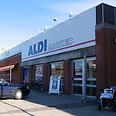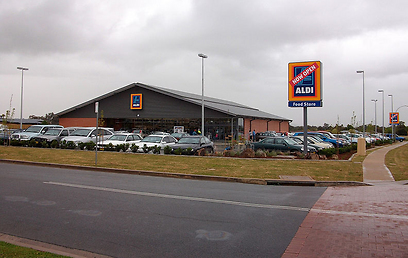
Settlements businesses voice concern over Dutch ban
Major Dutch retailers' announcement of settlement products ban may bring boycott wave, but Israeli businessmen in West Bank claim their factories contribute to peace
The announcement by three Dutch retail chains to stop carrying settlement products brought concern to Israeli West Bank business owners, some of whom hastily try to register their businesses within the Green Line.
Others, while fearing the economic repercussions, are adamant to keep their factories where they are.
Related stories:
- Netherlands: Retailers ban goods from settlements
- PM on EU decision: I will not allow harm to settlers
- Now it's official: EU 'boycotting' settlements
"The decision will cause us a lot of damage, that's obvious," said the CEO of a West Bank plastic factory, the products of which were until now sold by retail giant Aldi, one of the boycotters.

An Aldi supermarket
He nonetheless made clear he did not intend to change the location of his factory and expressed his hope that "the directors there will come to their senses." According to him, "We've yet to hear anything official from them and it's unclear when this will come into effect, but these kind of things come almost daily and it's not simple.
"Beyond the anti-Israeli scent, it's first-rate stupidity," he claimed. "Those hurt are mainly our Palestinian employees. If the export volume drops, we'll have to fire many of them."
The Dutch boycott is on the same line with similar boycott campaigns promoted by various organizations in Europe, which gain traction with an increasing number of companies and corporations. Recently, the EU lobbed a political bomb when it released new guidelines banning funding to Israeli entities involved in the West Bank.
"I don't market to the boycotting retailers but this is not good news for us," the owner of a food factory from the Jerusalem area admitted.
"Most of my job relies on export, mainly to Europe and also to Holland – one of the main markets. I've talked to colleagues and we hope the government knows what to do to stop the phenomenon.
"I've no intention to leave the industrial park that I work in but I know of several firms which just moved production someplace else and export to Europe from there, while leaving the activity directed to the local market and to the US in Judea and Samaria."
'Peace products'
Some business owners claim continued exports from the West Bank is a contributing factor for peace. "These decisions are the most harmful thing to co-existence and to the real connection here." Yehuda Cohen, a CEO of a West Bank business, insisted.
"We work with the Palestinians. There's nothing more beautiful than that and there's nothing which contributes more to peace. We start the peace from the bottom. Our products should be marketed as peace products."
Gershon Mesika, head of the Shomron Regional Council, repeated similar claims: "the Dutch retailers' decision is derived only from ignorance and from not knowing the terrain. Boycotting companies in the area mostly harms the Palestinian laborers and their families."
Many West Bank businesses enjoy government incentives and stimulus packages due to their location.
Meanwhile, a Foreign Ministry official expressed concern that the recent development will create a European wave of boycotts. "In Switzerland, Norway, and in Britain they have already boycotted settlement products.
"When a chain announces a product ban, it casts a shadow on Israel. It can create a wave of unknown proportions."
Deputy Dutch Ambassador Emiel De Bont said that his government "is working together with the EU's Foreign Ministers Commission with regards to the implementation of the EU's decision to correctly label settlement products.
"Holland objects to a boycott of Israeli products. This issue isn't on the agenda, and neither is it debated."
Attila Somfalvi contribued to this report
- Receive Ynetnews updates directly to your desktop










